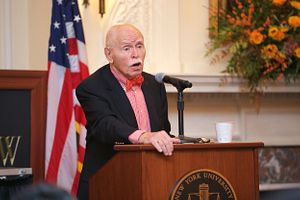The Chinese Communist Party (CCP) has contributed much to the success of the modern Chinese nation — a gradual liberalization strategy of the economy has produced widespread growth and raised the standard of living for millions of people. If China continues its current trajectory, it will be crowned the world’s largest economy not long from now.
No one would disagree, however, that China has also become an increasingly oppressive society, with an ever more authoritarian government suppressing the freedoms of its 1.4 billion citizens in order to meet policy objectives. The trend does not seem likely to be reversed anytime soon. In this interview, Jerome Cohen, a Professor of Law at New York University and lifelong friend of China, shares his views on the National People’s Congress’ upcoming decision to remove the presidential term limit from the Chinese Constitution.
Maurits Elen: Are peaceful power transitions in China, as seen since Deng Xiaoping, now less likely to occur without clear succession mechanisms in place?
Jerome Cohen: As many observers agree, ending the term limit is a recipe for increasing political instability and weakening, and perhaps even ultimately dividing the Party. With no designated successor, serious illness or death of the leader could lead to chaos long before the end of the second term, not to mention beyond that.
There are Western leaders who have served a prolonged time in office, sometimes more than a decade. How does this compare to Xi?
Long leadership in a democratic country places the leader and his party in an entirely different position. As the British public demonstrated after World War II when it repudiated the great Churchill after he led the country to victory, even the greatest leader can be replaced in a democracy. And remember the British decided to bring Winston back after they got a dose of Clement Attlee. It was all very orderly, even despite the fact that the U.K. was in a bad domestic shape and was losing its international power at the time.
At the 19th Party Congress last year, the Party and president made themselves more powerful, arguably at the expense of ordinary citizens and the private sector. Why?
What the Party and Xi Jinping get out of their mind-boggling efforts to control everything is unchallenged power. They claim this is essential in order to meet the country’s major problems in an effective way. But the costs are increasingly high and the jury will be out for some time before rendering its decision.
Authoritarian regimes can be the most effective form of government, as long as the leader is benevolent. Is China effective and is Xi benevolent?
In some ways, the party has proven to be very effective, for example in developing the nation’s transportation system, and in some ways it seems at a loss about how to cope, for example dealing with the domestic economy and with Taiwan.
It depends where one sits that determines whether he or she regards Xi Jinping as benevolent. Would human rights advocates and their lawyers regard Xi as benevolent? Or the tens of thousands of migrant workers who were cast into the cold in Beijing this winter? Or the hundreds of thousands of Uyghurs who are confined in “political education” camps that are the successors to “re-education through labor”?
An op-ed in the state-owned Global Times stated that ‘‘Chinese leaders are constantly on their toes due to the fear of losing their governing legitimacy.’’ What is your view?
I do think the current leaders are running scared, like a cat on a hot tin roof. That is why they resort to extreme measures to intimidate and repress those who want to be free to express their views. That is why they control information, engage in twisted propaganda, and establish supervisory commissions that constitute the modern Chinese version of the Spanish Inquisition. It is pathetic to see such powerful leaders resort to such repulsive tactics. The supervisory commissions under Party control will check on everyone else who counts, but who will check on the Party-led supervisors?
This interview has been edited for clarity.

































